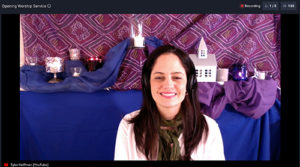CHHSM’s Virtual Annual Gathering a Success, Thanks to Active Participation, a Seamless Online Platform, and Incredible Presentations
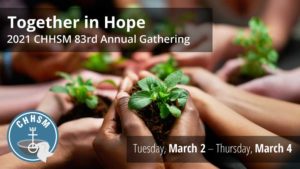
Inspirational, motivational, soul-feeding … and just plain fun. These are some of the words used by attendees to describe the recently concluded 83rd Annual Gathering of the UCC’s Council for Health and Human Service Ministries, held virtually March 2-4, 2021. Attendance records were shattered at the three-day event: some 335 CHHSM members and friends registered — more than double the number who typically attend CHHSM in-person meetings. Around the theme “Together in Hope,” the three days were filled with worship services, workshops, keynote speakers, and plenty of time for reflection and social gathering.
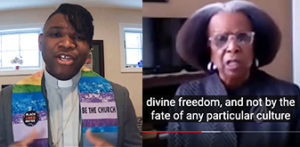
The Annual Gathering was bookended by two extraordinary worship services that included opening worship preacher the Rev. Darrell Goodwin, executive conference minister of the UCC’s Southern New England Conference and a CHHSM board member, and long-time UCC justice advocate the Rev. Dr. Yvonne Delk, who preached at the closing worship service.
“The movement from the opening worship through the plenaries to the closing worship was thoughtful, seamless, and well-orchestrated,” said Michael J. Readinger, CHHSM president and CEO. “Faith was the message from Darrell to start the Gathering. Hope was the call from Yvonne to leave the Gathering.”
The music in both services was led by Amanda Powell, director of music and worship at Disciples Christian Church in Cleveland Heights, Ohio, and a frequent soloist with the renowned Apollo’s Fire. A profound video presentation of “I Believe” by Mark Miller from the Chancel Choir of Christ Church in Summit, N.J., highlighted the closing worship service. Both services included prayers and litanies written by CHHSM’s the Rev. Dr. Elyse Berry, associate for advocacy and leadership development.
Berry called the worship services “incredible. The music, the sermons, the liturgy, the creative ways we were invited to be part of the spiritual community … I was more in ‘project mode’ when we were getting started; and yet, it was not long in to the opening prayer that I felt myself being replenished and deeply moved.” She added that the intentionally grounding throughout the Gathering made it feel “like sacred time — a time set apart — to listen for what God is saying to us in our ministries.”
The Spiritual Grounding time was provided on day two by the Rev. Nicole Havelka, UCC minister and Mindful Leadership consultant; and on day three by the Rev. Julie Jennings, vice president of ministry at Cedar Community in West Bend, Wis., and the Rev. Susan Drake, pastor of Parkside Community United Church of Christ in Saukville, Wis.
The Annual Gathering included daily keynote addresses. Kaitlin Curtice, author of Native: Identity, Belonging and Rediscovering God, opened the first plenary with a talk on how telling one’s personal and collective stories truthfully can pave the way to naming injustices and working to dismantle the racism inherent in our institutional and societal systems.
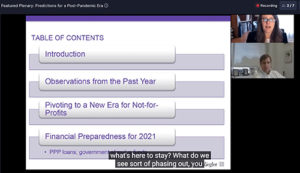
The March 3 plenary was presented by Annual Gathering platinum sponsor Ziegler, the Chicago-based privately held investment bank, capital markets and proprietary investments firm that specializes in the healthcare, senior living and education sectors. The discussion, “Predictions for a Post-Pandemic Era,” was presented by Ziegler’s Lisa McCracken, director of senior living research and development, and Tommy Brewer, managing director in the senior living finance practice. Topics ranged from preparing for whatever the new normal might be, as well as financial information on such items as PPP loans and nonprofits needing nimble budgeting to adjust to the changing financial climate.
The closing plenary presentation from the Rev. Dr. Dietra Wise Baker — director of contextual education at UCC-related Eden Theological Seminary in Webster Groves, Mo. — asked attendees to consider how their organizations can move from simply serving their communities to saving them via advocacy and partnerships with community activists. She asked CHHSM members to name one thing that could happen that would cause their organization to become unnecessary, and urged them to return to their communities ready to implant that “seed of hope” into their mission, vision, and daily work.
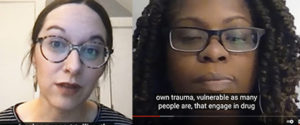
“Both in Kaitlin’s and Dietra’s keynotes, they spoke of honoring and uplifting people’s stories, listening deeply and honestly to their needs, and ensuring that we are centering their voices. As Dietra stated, we often tell people what services we have to offer, not particularly paying attention to what they are saying they need,” said Stephanie Franklin, senior vice president for family and community connection at Chicago-based UCAN. “As CHHSM organizations, we need to continue to plan WITH and not FOR people and communities; we need to walk beside them.”
Each plenary included a reflection time built into the schedule to enable attendees to further process what they had just heard, and to exchange ideas with each other. “The reflection groups really allowed us to process what we heard in a small group setting that was intimate and powerful,” said Readinger. “An added bonus was the continued presence of mostly the same individuals in each of the reflection group sessions. That really allowed us to have deeper connections with each other that I will never forget.”
Workshops Carried Through Annual Gathering Theme
A highlight across the three days were a number of workshops, on a variety of topics related to “Together in Hope.” Two were panel discussions.
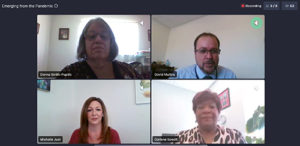
“Emerging from the Pandemic” was moderated by David Mullins, president and CEO of Crossroad Child & Family Services in Fort Wayne, Ind. It included panelists Michelle Just, president and CEO of Beatitudes Campus, an older adult community in Phoenix; Donna Smith-Pupillo, executive director of Deaconess Nurse Ministry in St. Louis; and Darlene Sowell, president and CEO of Unleashing Potential, which provides services for children and families in St. Louis. Mullins structured the discussion around three main questions: the challenges faced in response to the onset, duration, and hopeful conclusion of the COVID-19 pandemic; how each organization will operate in the future with the threat of ongoing virus mutations and vaccine availability difficulties; and what gives each panelist the greatest sense of hope as the world starts to emerge from the COVID-19 pandemic.
All three panelists highlighted resiliency, often greater than they knew their staff possessed, and long-term changes in operations due to adapting to cutting-edge technology as necessary to continuing their work. They also cited nimbleness — from changing plans quickly because of new regulations from the CDC to adapting “normal” procedures to achieve the same level of service to clients — as essential to their organizations being able to weather the COVID-19 storm.
They also discussed systemic racism, and the inequities brought to light due to the COVID-19 pandemic. Sowell noted that the community overall is more aware of the disparities due to race. “The disparity divides have become much more obvious and that allows us to stress the important work we do,” she said. “The COVID-19 pandemic has amplified this. The majority of families we serve [at Unleashing Potential] are Black and Brown, where there has been a disproportionate number of deaths from the virus. It is important for all of us to work together, for the community, city and country.”
The other panel discussion was on stewardship: “What Will Stewardship and Finance Look Like Post-COVID?” Panelists included the Rev. Charles Buck, president and CEO of United Church Funds; Matt Wagner, UCF’s vice president of institutional relationships; and Jacqueline Owen, the Rev. Kent Siladi, and the Rev. Andrew Warner, all development and philanthropy staff for the United Church of Christ’s national setting in Cleveland.
“The two panels really provided a lot of details for how we emerge from the COVID pandemic, but both made it clear that we will not be going back to the way things were,” said Readinger. “The term ‘new normal’ was not used a lot, but it was implied often as the panelists in both sessions talked about using technology more and more going forward, and committing to using the lessons learned from the last year in moving forward.”
CHHSM’s Berry led a workshop called “A Reason to Have Hope: A Public Health Response to Racism.” Berry addressed why it is important to frame racism as a public health crisis in advocacy efforts, and gave participants useful tools for their own work.
“In addition to the vast number of resources listed on the CHHSM Anti-Racism website section, Elyse was able to log into a number of resources [during] the chat, including an advocacy alert,” says Paula Barker, CHHSM’s executive assistant for events and administration. “It felt empowering to have a tangible action item that I could click in real time. Additionally, with Sandy Sorenson — CHHSM board member and UCC Justice and Witness Ministry director — chiming right in, it almost was better than an in-person setting.”
Another popular workshop explored the Equity Competent Leadership model in developing new leaders by Erica Merritt, founder and principal consultant of the Equius Group LLC. Equius Group is conducting CHHSM’s racial equity assessment this year.
Several workshops specifically addressed aspects of faith-based serving leadership. The Rev. Scott Brooks-Cope, director of pastoral care at Phoebe Ministries, addressed “Spiritual Care for Staff and Residents in the Midst of a Pandemic.” Brendyn Simmons, executive director of Generation Care Partners Foundation, discussed escaping martyrdom and avoiding burnout while heeding a call to health and human service ministry. The Rev. Nicole Havelka rounded out the leadership workshops with one on visioning hope and grounding into the core values and mission of an organization.
During the spiritual care workshop, presenter Brooks-Cope “spoke about a wall of hope, which really resonated with the group,” said Barker. “Messages of encouragement were posted on a board and they would take time to read through them, sometimes pray, sometimes just say words of hope afterwards. It reminded me of how important it is during this time to life one another in hope.”
The Rev. George Graham, vice president of CHHSM, found distinctions made during the workshops helpful, “such as the difference between discomfort and pain in the workshop by Nicole Havelka, and the difference between stress and burnout by Brendyn Simmons. Their distinctions gave me new frames and tools for my own ministry.”
Two workshops dealt specifically with dealing with trauma. Niquanna Barnett, in-home family therapist and intake specialist for Orion Family Services in Madison, Wis., led an updated version of the “Historical Trauma: Understanding Impact and How to Move Forward” workshop that she led last year. The Rev. Samantha Jewell, chaplain at Bellewood & Brooklawn in Louisville, Ky. — which works with children, youth and families — presented a workshop on “Using a Trauma Informed Lens to Create Hope.”
“Having been introduced at the 2020 Gathering to Historical Trauma, I could hardly wait for Niquanna Barnett’s workshop,” said Bruce Roller, executive director of United Church Outreach Ministry in Wyoming, Mich. “I was not disappointed as she reviewed some information and added layers of examples and experiences of real-life people affected by historical trauma.”
CHHSM’s Graham said he was “really struck by the ways that the workshops echoed the themes of the keynotes. For instance, Kaitlin Curtice’s discussion about healing from her own trauma was picked up in the workshops by Niquanna Barnett and Samantha Jewell. This allowed participants to think about critical issues from multiple perspectives.”
One popular feature of the plenary and workshop sessions was a “chat” feature. Attendees could key in questions and comments throughout each presentation, which helped provide spirited and in-depth Q&A sessions following the presentations.
“I was surprised by the profound sense of religious belonging that I experienced in our first-ever virtual Annual Gathering,” said the Rev. Dr. Monica Dawkins-Smith, executive associate for the UCC’s Wider Church Ministries and Operations, and a CHHSM board member. “Our faith and faith values were threads woven throughout worship, the keynote addresses, and workshops with topics related to financial investment strategies unapologetically guided by faith values and commitment to racial equity.”
Business Meeting Honors Retirees, Welcomes New Members
During the Annual Business Meeting March 3, retiring board members the Rev. Dr. Laverne Joseph and the Rev. Monica Wedlock-Kilpatrick were honored. Joseph also has retired from more than 50 years of ministry, including decades at Retirement Housing Foundation, based in Long Beach, Calif., and was featured in a short video presentation during the business meeting.
Other retiring executives also were honored, including the Rev. Bonnie Condon from Advocate Aurora Health, Chicago; Alice Graham, Ph.D., from Back Bay Mission in Biloxi, Miss.; Jane Ipsen of Carmel Valley Manor, Carmel-By-The-Sea, Calif.; Susan Tudor from Hitz Memorial Home, Alhambra, Ill.; and Randy Rider from Crossroad Child & Family Services.
New executives were welcomed, including Ralph Gaines, CEO of Embrace Living Communities in Oak Brooke, Ill.; Stuart Hartman, president and CEO of RHF; David Mullins, president and CEO of Crossroad Child & Family Services; Wendy Carpenter, CEO of EdenHill Communities in New Braunfels, Texas; Jeff Edmiastan, administrator at New Athens (Ill.) Home; the Rev. James Pennington, president and CEO of Back Bay Mission; MaKenzie Wilson, administrator at Hitz Memorial Home; and Jay Zimmer, president and CEO of Carmel Valley Manor.
The meeting honored several CHHSM members reaching milestone anniversaries, and also honored beloved leaders the CHHSM family has lost during the past year. Those leaders included Dorothy Barichak from Plymouth Harbor in Sarasota, Fla; the Rev. Dr. Dosia Carlson from Beatitudes Campus; CHHSM Board Member the Rev. Kathryn Kuhn from Cedar Community; Dr. Margaret Schultz from Emmaus Homes in St. Louis; and Dr. John Trnka from Retirement Housing Foundation.
The final business item was electing new board members for the coming year. These included board members Stuart Hartman, the Rev. Julie Jennings, the Rev. Leslie Jackson, as well as affirming the Rev. Dani Loving Cartright as an appointed member. In addition, the members of the board’s executive committee were announced: Chair Abby Drane, Vice Chair Michelle Just, Treasurer Jay Biere, and at-Large members Stephanie Franklin and Monica Dawkins-Smith.
Social Gatherings, Nollau Reunions and More
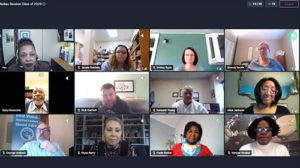
Each day of the Annual Gathering featured opportunities for social gatherings. From three-minute networking opportunities at the start of each day to end-of-the-day social gatherings and Nollau Leadership Institute class reunions, intentional time was planned for attendees to have meaningful interactions with each other.
“I really enjoyed the three-minute speed networking,” said Stacey Parke, executive director of Orion Family Services. “It was a great way to expand your CHHSM network and force us out of our cliques!”
CHHSM’s Barker found the networking a great way to meet new people. “I enjoyed the networking mini-sessions a lot,” she said. “It was nice to be able to sit and speak with someone for a short time. I got to meet new people and, hopefully, they will be able to join use next year in Louisville. I’d love to see them.”
Readinger concurred. “The networking space was amazing!” he said. “I had around 30 conversations in there. All were nice and it almost felt like we were actually chatting in the hallway at the Annual Gathering.”
Another similarity to an in-person Gathering was the exhibit hall, where attendees could visit virtual booths of event sponsors to learn more about their ministries. The social gatherings, including the Nollau Leadership Institute reunions, also proved popular.
The Annual Gathering mirrored the normal, in-person event thanks to both intentional planning and the robust virtual meeting platform — Hopin — chosen for the Gathering. From facilitating real-time chats and social time, to blending video presentations with live Q&A sessions, the Hopin platform allowed Annual Gathering participants to interact and enjoy the activities in a fashion similar to physically attending the event.
“The CHHSM team set up the virtual platform in a way that encouraged meaningful connection and dialogue,” said Stephanie Franklin of UCAN. “The chats were lively and inspirational — each person heard and interpreted the speakers and presentations from their lens and life experiences and shared generously with others. We were ‘Together in Hope’ in the chats.”
UCOM’s Roller agreed. “The thing I expected to miss most with a virtual Annual Gathering was the side conversations and social times for shop talking and processing with colleagues all the great information I knew we would derive from plenaries, worship, and workshops,” Roller said. “My biggest surprise is that I had sideline conversations with more people than I had at the Memphis in-person Gathering last year.”
Tyler Hoffman, CHHSM’s digital solutions consultant, developed and oversaw the Hopin platform. “Our hope for the virtual Annual Gathering was to replicate as much of what makes a typical CHHSM gathering special — spontaneous connections, impactful presentations and spirited discussion. To achieve that, we felt the technology needed to be as invisible as possible,” Hoffman said. “That meant working with our presenters to pre-record their presentations and then using a virtual “green room” to check their microphone and camera before they went live for Q&A.”
Hoffman added that the Hopin platform didn’t require presenters or attendees to install any special software, so the process for participation was seamless. “I’m especially pleased with how many of our attendees participated in one-on-one networking conversations — 137! — and how efficiently we were able to conduct voting during the Annual Business Meeting,” said Hoffman.
During the Gathering, CHHSM’s Readinger talked about holding a hybrid meeting next year. Hopefully, the lessening of the COVID-19 pandemic will allow the 2022 Annual Gathering to take place in Louisville, Ky., as planned. But Readinger stressed that, based on the success of this year’s Gathering, some sort of virtual platform would also be necessary to enhance the overall experience.
Many attendees cited two positive aspects of the virtual event: the ability to re-watch the presentations — or view other workshops — on CHHSM’s YouTube site and the ability to include more staff members in the Annual Gathering as a result of its online presence. Almost all the attendees also highlighted the value of connections made during the event.
“It was great that the team was able to pull off the virtual AG. Kudos!!” said the Rev. Sheila Guillaume, CHHSM board member and pastor of Union Congregational UCC in West Palm Beach, Fla. “The people attending seemed to leave wanting more … and that means CHHSM’s right on the pulse of what matters to folks. Yay!”
CHHSM Board Chair Abby Drane, president and CEO of Bellewood & Brooklawn/Seven Counties Services, closed the Annual Gathering by thanking everyone for attending. “Thank you to our sponsors, our Annual Gathering Task Force, and everyone who worked to make this conference such an inspiring event,” Drane said. “We hope you feel uplifted and more confident that, together in hope, we can realize our vision of a just, caring and compassionate world.”
Drane closed with a personal invitation. “We hope to see you IN PERSON at next year’s Annual Gathering, which will be March 8-10, 2022, in Louisville, the place that I call home.
“We look forward to welcoming you there!”
Read about the Annual Gathering worship services.
Read about Kaitlin Curtice’s and the Rev. Dr. Dietra Wise Baker’s keynote addresses.
Join Our Mailing LIst
"*" indicates required fields
Follow on Facebook
Pension Boards appoints David A. Klassen as its President, CEO - United Church of Christ
www.ucc.org
The Pension Boards, an affiliated ministry of the United Church of Christ recently announced its appointment of David A. Klassen as its next President and
